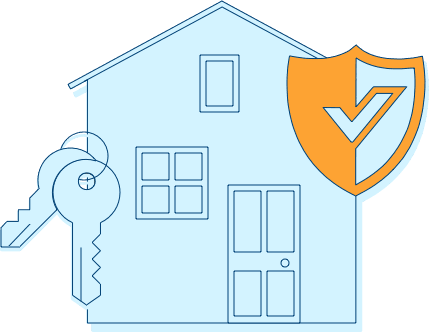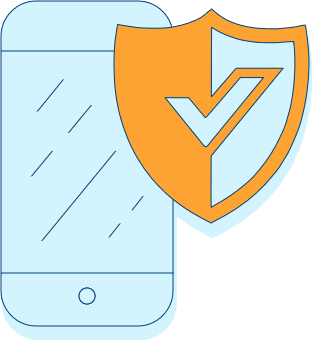Making Safety a Priority
You’re ready to leap off campus—we’re ready to help. Once you make the switch to off-campus living, you’ll no longer have access to dorm-floor RAs, key-card secured buildings, or the constant patrol of campus police. So how do you stay safe?
The team at home security site, YourLocalSecurity.com (YLS), compiled this go-to resource guide on how to live off campus safely, so you’ll be prepared as you spread your wings.

Personal Safety Tips
First things first: let’s talk about personal safety. Practicing personal safety habits will serve you no matter where you choose to live. Here are a few of our top picks:

Home Safety Tips
Once you decide to live off campus, it’s smart to up your home security game. Here are a few tips to safeguard your off-campus rental property.
Invest in a Home Security System.
Installing a security system isn’t as expensive as you might think. Many home security companies offer new-customer deals and packages at affordable rates.
Lock Valuables in a Safe.
Keep that diamond necklace from grandma—or that Game of Thrones model dragon—away from burglars’ eyes in a password-protected safe.
Buy a Few Smart Lights.
Give your home a bright appearance even when you’re in class. Smart bulbs let you control your lights from your smartphone or create lighting schedules for a lived-in look.
Lock Doors and Windows.
This one might seem like a no-brainer, but it also can be chronically overlooked. Pay special attention to ground-floor windows and doors and avoid giving out an extra key.
Maintain Front-Door Safety Protocol.
If you don’t have a front-door peephole, ask your landlord to install one. Never feel pressured to open for a stranger, and say “I got the door!” before answering to appear as though you’re not alone.

On The Go Safety Tips
While you’re out and about, it’s not just your home that can be a target, but you. Here’s a list of top-rated safety apps to help you stay safe when you’re heading to class—or out on the town.
- ADT Go
- Circleof6
- Noonlight
- bSafe
ADT Go features an easy-access SOS button you can press to contact trained ADT professionals 24/7. First, they’ll call you to see if you’re ok. If not, they’ll contact police on your behalf.
A user-friendly way to keep in touch with your close friends or family, Circleof6 lets you quickly text your location to six loved ones if you find yourself in a less-than-safe situation.
Send your location to emergency personnel in one tap with Noonlight. This app features certified dispatchers on call 24/7 and a “send help!” widget option for your lock screen.
The bSafe app offers a voice-activated alarm so you won’t have to fiddle with your phone to call for help. You can also send an SOS to loved ones with a button or by speaking a key phrase.

Safety with Roommates
Once you’ve found the apartment of your dreams, you might need some help to pay for it. Enter roommates. These live-in pals can be a fantastic way to make friends, save money, and stay safe—providing they are safe, too.
Here are a few tidbits to consider before you sign a lease with another human:
Don’t Rely on CraigsList.
The Internet can be a wonderful—yet frightful—place. If you don’t know anyone who needs a roomie, you might need to reach out to a larger circle. Don’t immediately jump to Craigslist. Publically accessible online forums offer minimal privacy precautions and don’t tend to vet their members.
Live With Someone You Know.
Whenever possible, choose to share a living space with a friend or mutual acquaintance. We recommend reaching out to people in your inner and outer circles or asking your college if you can advertise on a private email distribution or campus bulletin board.
Share Background Checks.
Don’t enter into a roommate situation blindly. If you can’t live with a friend, ask prospective roommates to agree to mutual background checks. Seem like overkill? Ideally, it would just be a formality. But if someone is unwilling to do this, it could be a sign there’s something they don’t want you to see.
Consider Your Living Location.
Once you’ve landed a roommate you can trust, consider scouting neighborhoods during the day and night before you buy or rent. Use tools like AreaVibes or CrimeReports to seek out safe areas of your city and find a place you and your roommates feel most safe in.

Safety Laws and Resources
Know the laws and resources available to you before danger strikes.
Here are a few tidbits to consider before you sign a lease with another human:
Clery Act.
Established in 1990, the Clery Act requires colleges and universities to disclose specific kinds of crime statistics and security data to put safety information in the hands of students and their parents.
National Center for Campus Public Safety.
This government-funded organization works to equip students, teachers, and staff to promote safety on college campuses.
Campus Police Escort Service.
If you have a late class and don’t want to walk a dark campus alone, contact campus police. Many colleges and universities are prepared to accompany a student to and from class with a simple phone call.
Campus Safety Data Tool.
The Campus Safety and Security Data Analysis Cutting Tool (yes, it’s a mouthful!) from the U.S. Department of Education helps you navigate safety on your specific campus.
Your Guide to the Safest Universities in America.
Check out our 2019 report on the 25 safest universities and campuses in the U.S. so you can choose a college—or make a switch!—with confidence.
Long-Term Safety
One surefire way to protect yourself and property at home is to install an ADT monitored home security system. These systems offer burglar alarms and 24/7 professional monitoring, so that even if you’re away, the ADT team will come to your aid.
Sources:
https://www.fordham.edu/info/23009/off-campus_student_info/4660/off%E2%80%93campus_safety_tips
http://ruoffcampus.rutgers.edu/safety-security/
https://deanofstudents.umich.edu/article/tips-safe-campus-house
